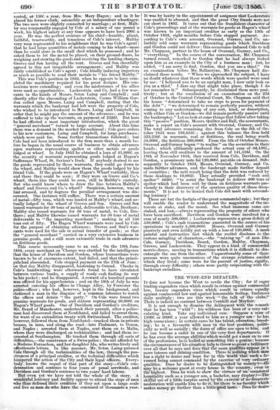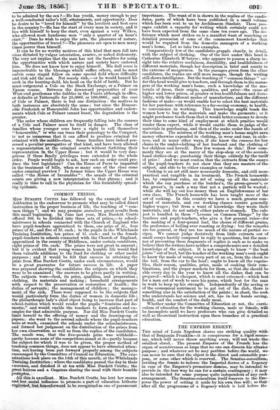THE WEST-END DEFAULTS.
IT does not become the West' to tevile the City ; for if eager trading engenders vices which result in crimes against commercial law, luxury engenders vices which -result in crimes equally against commercial law and against-honourable feeling. Instances daily multiply; two are this week "- the talk -of the clubs." There is indeed no contrast between Cornhill and Mayfair.
It is not enough to dismiss the .delinquent with the remark that he has been "wild" ; his wildness has been of a very cal- culating kind. Take any individual case. Suppose a man of 15001. or 20001. a year allowed to him as a younger son : he has high' connexions ; certain cases he has talent, education, breeds
; lie is' a favourite with men in the best positions, politia cally as well as socially ; the doors of office are open to him, and he can become a cadet in one of the very first departments. If he has even the average abilities which would get a man on in one of the professions, he is hailed as something like a genius ; because the circumstances of his situation help to throw se great a brilliancy over all that he says and does that the same qualities- appear in a more intense and shining condition. There is nothing which mail has a right to desire and hope for in this world that such a fa- Oared being cannot command by the exercise of very -orclinar qualities. Does he desire to be distinguished in iiemety ? !try be a welcome guest at every-house m the- country,- even in the highest. Does he wish to show the virtues 'of an oeeasioind hospitality such as a younger son, a bachelor, may display?—The skilful use of a little surplus saved by the exercise of no:desperate moderation will 'enable him to do-it, for there is no faculty which makes money go further than a little‘eod taste-. Does-he desire to be admired by the sex ?-11e has youth, money enough to pay a well-conducted tailor's bill, attainments, and opportunity. Does he desire to be " loved for himself " by the loveliest and best eyes in the. country ?—iLe has the start of every man in society, and it lies with himself to keep the start, even against a very Wilkes, who .allowed most handsome men " only a quarter of an hour's start"- Does he wish to enjoy the arts, the pleasures of nature, the opportunities of travel ?—The pleasures are open to men many tikes _poorer than himself: It can be for no worthy motives of this kind. that men fall into vices dictated by.vulgar ostentation, avarice, or naked dishonesty. The very act implies that the man Lis not the faculties for using the opportunities with which nature and society have endowed him. He does not know how to enjoy himself. His dull sense is impenetrable to the blessings which suffice others, and he must ontvie some stupid fellow on some special field where difficulty, and riskadd the zest. Not manly risk,—or he would hazard lns neck in. the hunting-field, his head on the field of battle. But he must outgeneral a Cole on the Stock Exchange, or a Palmer on Epsom course. Between the downward propensities of your West-end gentleman who dabbles in the Funds although in office, or defaults at Tattersalls for 25,0001. or 100,0001., and the case of Cole or Palmer, there is but one distinction : the motives in. bOth instances are absolutely the same ; but since the Honour- able Frederick or Honourable John has opportunities and endow- ments which Cole or Palmer cannot boast, the degradation is the greater: The order whose children are frequently falling into the courses of a Cole and Palmer must be itself in danger. The class of families whose younger sons have a right to call themselves "-honourable," or who can trace their genealogy to the Conquest, is- not so numerous that it can afford to produce criminal for criminal with the middle-class. Some families have indeed pos- sessed a peculiar prerogative of that kind, and have been allowed a representation at the criminal courts without forfeiting their representation in the Upper House ; but it would be very dan- gerous if these family- privileges were extended to the whole eider. People would begin to ask, how such an- order could pro- duce the best legislators ? Can the House of Peers be impartial in the treatment of •bills when so many sons -of. the class come under: criminal purview In former times the Upper House was called -" the House. of Incurables " : the .annals of the criminal courts are giving a new interpretation to that phrase ; and it really is time to call in the physician for this formidably spread- ing 'epidemic.



























 Previous page
Previous page